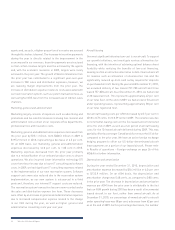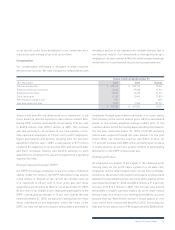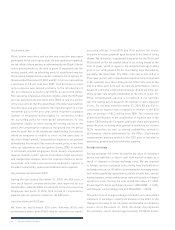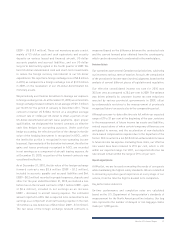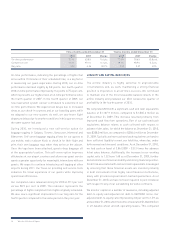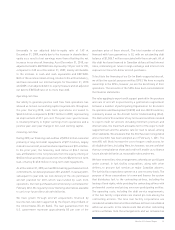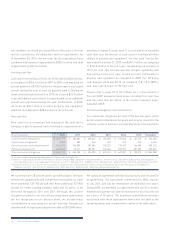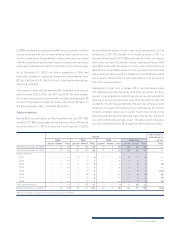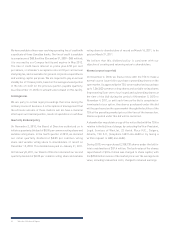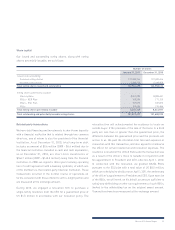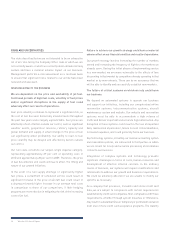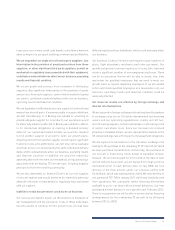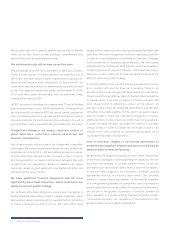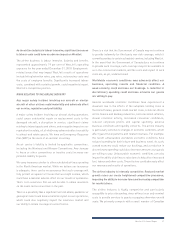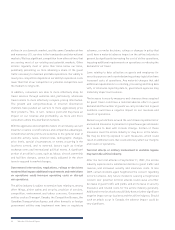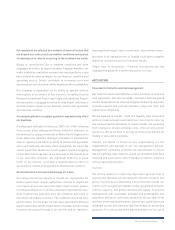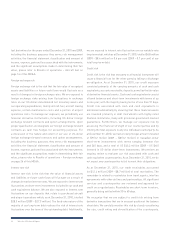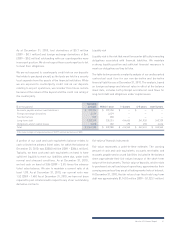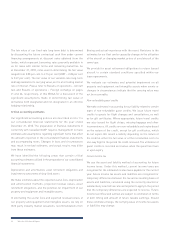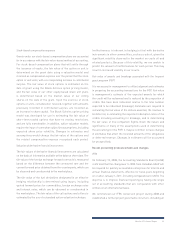Westjet 2010 Annual Report Download - page 36
Download and view the complete annual report
Please find page 36 of the 2010 Westjet annual report below. You can navigate through the pages in the report by either clicking on the pages listed below, or by using the keyword search tool below to find specific information within the annual report.
34 WestJet 2010 Annual Report
RISKS AND UNCERTAINTIES
The risks described below are not intended to be an exhaustive
list of all risks facing the Company. Other risks of which we are
not currently aware or which we currently deem immaterial may
surface and have a material adverse impact on our business.
Management performs a risk assessment on a continual basis
to ensure that significant risks related to our airline have been
reviewed and assessed.
RISKS RELATING TO THE BUSINESS
We are dependent on the price and availability of jet fuel.
Continued periods of high fuel costs, volatility of fuel prices
and/or significant disruptions in the supply of fuel could
adversely affect our results of operations.
Fuel price volatility continues to represent a significant risk, as
the cost of fuel has seen historically elevated levels throughout
the past few years and is largely unpredictable. Fuel prices are
affected by a host of factors outside our control, such as significant
weather events, geopolitical tensions, refinery capacity and
global demand and supply. A small change in the price of fuel
can significantly affect profitability. Our ability to react to fuel
price volatility may be delayed and affected by factors outside
our control.
Our fuel costs constitute our largest single expense category,
representing approximately 29 per cent of operating costs in
2010 and approximately 28 per cent in 2009. Therefore, the price
of fuel has affected, and could continue to affect, the timing and
nature of our growth initiatives.
In the event of a fuel supply shortage or significantly higher
fuel prices, a curtailment of scheduled service could result. A
significant increase in the price of aircraft fuel could result in
a disproportionately higher increase in our average total costs
in comparison to those of our competitors, if their hedging
programs are more effective in mitigating the risk of the increasing
costs of jet fuel.
Failure to achieve our growth strategy could have a material
adverse effect on our financial condition and results of operations.
Our growth strategy involves increasing the number of markets
served and increasing the frequency of flights to the markets we
already serve. During the initial phases of implementing service
in a new market, we are more vulnerable to the effects of fare
discounting in that market by competitors already operating in that
market or by new entrants. There can be no assurance that we
will be able to identify and successfully establish new markets.
The failure of critical systems on which we rely could harm
our business.
We depend on automated systems to operate our business
and support our initiatives, including our computerized airline
reservation systems, telecommunication systems, aircraft
maintenance system and website. Our website and reservation
systems must be able to accommodate a high volume of
traffic and deliver important and accurate flight information. Any
disruption in these systems could result in the loss of important
data, reallocation of personnel, failure to meet critical deadlines,
increased expenses, and could generally harm our business.
Key technology systems, including our revenue accounting system
and reservation systems, are outsourced to third parties on whom
we are reliant for timely and accurate processing of information
critical to our business.
Integration of complex systems and technology presents
significant challenges in terms of costs, human resources and
development of effective internal controls. In the ordinary
course of business, our systems will require modifications and
refinements to address our growth and business requirements.
We could be adversely affected if we are unable to modify our
systems as necessary.
As a company that processes, transmits and stores credit card
data, we are subject to compliance with certain requirements
established by credit card companies. Non-compliance with these
requirements, whether through system breaches or limitations,
may result in substantial fines or temporary or permanent exclusion
from one or more credit card acceptance programs. The inability


